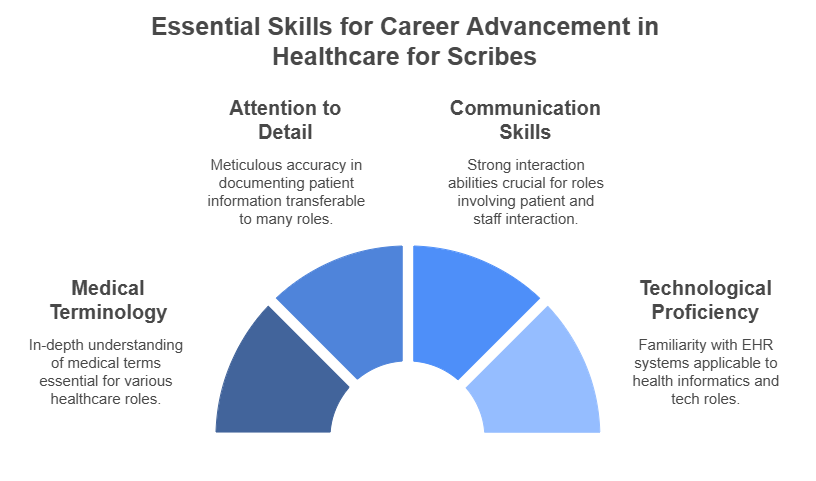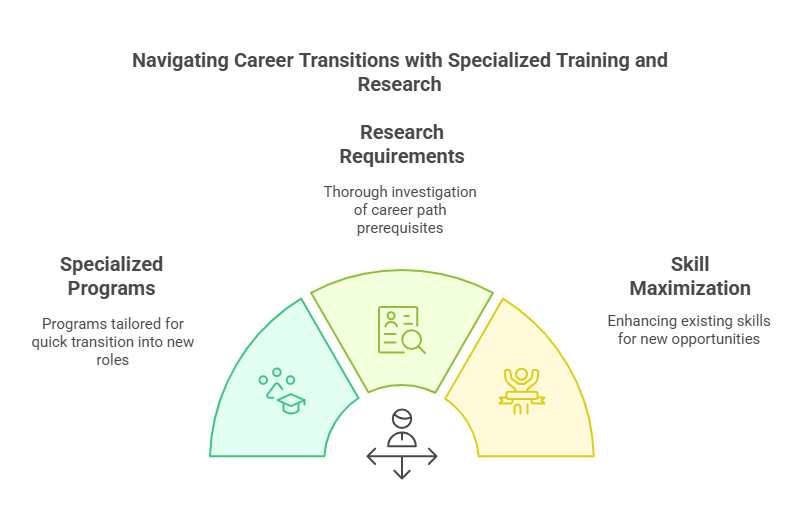Can Medical Scribes Transition Into Healthcare Careers?
In the ever-evolving world of healthcare, medical scribes play an essential role in assisting doctors and healthcare providers by documenting patient encounters and medical histories. But as healthcare careers continue to diversify, many aspiring professionals ask themselves: "Can medical scribes transition into healthcare careers?" This blog will delve into the possibilities for scribes looking to expand their roles and take the next step in their healthcare journey, with a focus on career growth opportunities, training, and the skills needed to transition successfully.
Understanding the Role of a Medical Scribe
Before we dive into the career transition possibilities, it's important to understand what a medical scribe does. Medical scribes are professionals who assist healthcare providers by documenting patient information, including medical histories, test results, and treatment plans. This role allows doctors to focus on patient care while ensuring that their documentation is thorough and accurate. Medical scribes often work in a variety of healthcare settings, including hospitals, clinics, and private practices. With the growing use of electronic health records (EHR), the demand for skilled medical scribes has increased significantly, making it a stable career option for many.
Key Skills and Attributes of Medical Scribes
To transition successfully into another healthcare career, medical scribes need a strong foundation of skills and attributes that will support their next steps. These skills not only make scribes valuable in their current roles but also equip them for growth in various healthcare fields.
Knowledge of Medical Terminology: Scribes have an in-depth understanding of medical terminology, which is essential when moving into roles such as medical assistants, healthcare administrators, or even medical billing and coding. This expertise allows them to quickly adapt to new responsibilities, communicate effectively with healthcare professionals, and understand complex medical concepts.
Attention to Detail: Accuracy and meticulous attention to detail are essential in documenting patient information. Medical scribes must capture every aspect of a patient's encounter accurately, which makes this skill highly transferable to various healthcare roles, including clinical research, patient care coordination, and compliance management.
Communication Skills: Medical scribes interact with healthcare providers, patients, and administrative staff regularly, making strong communication skills a crucial attribute. These abilities not only improve efficiency but also make scribes ideal candidates for roles like medical office managers, patient care coordinators, or roles that require frequent interaction with patients and medical teams.
Technological Proficiency: Familiarity with electronic health record (EHR) systems is a core skill for medical scribes. This technical know-how is highly applicable to fields such as health informatics, medical IT support, and healthcare technology management. As the healthcare industry continues to integrate more technology, medical scribes' proficiency in EHRs makes them valuable assets in tech-heavy roles within the industry.
Can Medical Scribes Transition Into Other Healthcare Roles?
The good news is that medical scribes have a unique advantage when transitioning into other healthcare careers. Medical scribes are already deeply familiar with medical terminology, patient care processes, and healthcare systems. These foundational skills make them well-prepared for various roles in the healthcare industry. Because they understand the medical field and its operational nuances, medical scribes have the opportunity to transition into a wide range of roles. Below are some of the most common healthcare careers that medical scribes can pursue, showcasing how their existing knowledge and skills can serve as a solid base for further career growth.
Medical Assistant
Medical assistants are healthcare professionals who work alongside physicians, nurses, and other healthcare providers to assist with both administrative and clinical tasks. Their duties include taking vital signs, preparing patients for exams, assisting in minor procedures, and handling medical records. Medical scribes, who already have a thorough understanding of medical terminology, patient care, and clinical processes, are highly equipped to transition into this role. Though additional training may be necessary, many programs offer certification for individuals with a scribe background. This path allows scribes to expand their clinical and administrative skills, making them more versatile healthcare professionals.
Healthcare Administrator
Healthcare administrators manage the day-to-day operations of healthcare facilities, such as hospitals, nursing homes, and outpatient clinics. They are responsible for overseeing budgets, staffing, ensuring compliance with healthcare regulations, and managing patient care services. For medical scribes who are organized, detail-oriented, and have strong leadership and communication skills, transitioning into healthcare administration can be a rewarding career move. Scribes are already familiar with how healthcare facilities operate, and obtaining a healthcare administration certification or degree can open doors to managerial roles in this sector.
Medical Billing and Coding Specialist
Medical billing and coding specialists are responsible for ensuring that healthcare providers are reimbursed for the services they deliver. This role requires knowledge of medical codes, insurance policies, and regulations governing healthcare billing. Medical scribes are already accustomed to handling patient records and have an in-depth understanding of medical terminology, making them highly suited for this career. Scribes looking to transition into this field will need to complete additional coursework or certification in medical billing and coding, but their background in healthcare documentation gives them a strong advantage.
Health Informatics Specialist
Health informatics is a growing field that blends healthcare with information technology (IT) and data management. Health informatics professionals work to enhance the quality of patient care by leveraging healthcare data and implementing technological solutions, such as electronic health records (EHR) systems and data analysis tools. For medical scribes who have a keen interest in technology and data management, this field offers exciting opportunities. Given their experience with EHR systems, scribes can transition into health informatics roles relatively smoothly. Additional training in IT or health informatics can help scribes pursue this growing and high-demand career.
Physician Assistant
Physician assistants (PAs) are licensed healthcare providers who perform a range of tasks, including diagnosing and treating illnesses, prescribing medications, and assisting in surgeries. The role of a PA is similar to that of a physician, but PAs typically work under the supervision of a doctor. Medical scribes who have a passion for patient care and want to become more involved in the clinical aspects of healthcare can pursue a physician assistant program. This transition requires significant additional education and clinical training, but it is an achievable goal for motivated scribes who wish to take on a more hands-on and autonomous role in patient care.
Nurse
Registered nurses (RNs) are essential members of the healthcare team, providing direct patient care, administering medications, and monitoring patient recovery. Scribes who are interested in providing more direct patient care may consider pursuing a nursing career. While transitioning into nursing requires enrolling in a nursing program, the medical knowledge that scribes already possess can significantly shorten the learning curve. Scribes are familiar with patient care processes, medical terminology, and healthcare systems, all of which will be beneficial when pursuing an RN role. Whether through an accelerated nursing program or a traditional nursing degree, medical scribes can leverage their background to transition into this highly rewarding and in-demand career.
Medical Sales Representative
Medical sales representatives are responsible for selling medical products, equipment, and services to healthcare professionals, such as doctors, hospitals, and clinics. They must have a deep understanding of medical products and their applications to effectively communicate the value of these products to healthcare providers. Medical scribes who have a strong grasp of medical terminology and the healthcare system can transition into this field with relative ease. Additionally, those interested in business and sales may find this career path rewarding, as it combines the healthcare knowledge they already have with the opportunity to engage in sales and client relations. Many medical sales representatives also earn attractive commissions based on their sales, making it a financially rewarding career option.
Benefits of Transitioning From a Medical Scribe to Other Healthcare Careers
Transitioning from a medical scribe to a new healthcare career can offer numerous benefits that help professionals grow both personally and professionally. Below are some of the key advantages of making this shift:
Career Advancement
One of the most significant benefits of transitioning from a medical scribe to another healthcare career is the potential for career advancement. By pursuing additional certifications, qualifications, or specialized education, medical scribes can elevate their professional standing. For instance, moving into roles such as medical assistant, healthcare administrator, or physician assistant typically comes with increased responsibilities and higher earning potential. With each new role, scribes gain valuable experience, which opens the door to leadership or specialized positions within the healthcare sector.
Job Stability
The healthcare industry is one of the fastest-growing sectors, providing a high level of job security. As demand for healthcare services continues to rise, particularly in aging populations, opportunities for career growth and stability within the field are abundant. Whether transitioning to a clinical, administrative, or technical role, medical scribes are well-positioned to secure stable, long-term employment. Additionally, healthcare jobs often come with competitive benefits, making it a reliable field for long-term career planning.
Personal Fulfillment
Many healthcare careers, such as nursing or becoming a physician assistant, provide professionals with the opportunity to make a direct impact on patient care. For those medical scribes passionate about helping people, transitioning to a role that involves direct patient interaction can be incredibly fulfilling. Being able to witness the difference they make in patients' lives adds a sense of purpose and satisfaction to their daily work.
Skill Utilization
Medical scribes acquire a broad set of valuable skills, such as strong communication abilities, proficiency with healthcare technologies, and in-depth medical knowledge. These skills are highly transferable across various healthcare roles. For instance, a scribe’s experience with electronic health records (EHR) and medical terminology makes them well-suited for positions in health informatics, medical billing, or administrative management. By transitioning to these new roles, scribes can fully leverage their existing skills while gaining new ones to advance their careers.
Training and Education for Career Transition
While medical scribes possess a strong foundation in healthcare terminology, patient care, and clinical processes, transitioning into new healthcare careers often requires additional training or certification. Fortunately, there are numerous specialized programs available that cater specifically to individuals with a medical scribe background. These programs are typically designed to be shorter in duration, focusing on the key skills and knowledge required for the next career step, ensuring a smoother transition. For example, becoming a certified medical assistant can often be accomplished in less than a year, while roles like nursing or physician assistant require more extended educational commitments. Aspiring healthcare professionals should thoroughly research the requirements for their chosen career path and select the right program that aligns with their interests and long-term goals. This approach not only maximizes their skills but also ensures they are well-prepared for new opportunities within the healthcare industry.
What Does the Future Hold for Medical Scribes in 2025?
As healthcare continues to expand, the demand for medical scribes will remain strong. The rapid growth of telemedicine, an increased reliance on electronic health records (EHR), and the ongoing need for efficient healthcare delivery mean that medical scribes will continue to be integral to healthcare teams. In 2025, the role of the medical scribe will evolve alongside technological advancements, opening up even more career opportunities and potential for specialization. This creates a promising future for medical scribes seeking new paths for career growth and development within the ever-changing healthcare landscape.
Conclusion
Medical scribes are uniquely positioned to transition into a variety of healthcare careers, thanks to their knowledge of medical terminology, patient care, and healthcare systems. Whether pursuing a role as a medical assistant, healthcare administrator, or physician assistant, there are numerous opportunities for career growth. With the right training and education, medical scribes can take the next step in their healthcare journey. At ACMSO, we offer comprehensive medical scribe certifications that provide the foundation for a successful career in healthcare. Our certifications are designed to equip you with the skills and knowledge needed to excel in this essential field.
Lesser-Known Facts About Medical Scribes:
Scribes help reduce physician burnout by allowing doctors to focus more on patient care and less on documentation. Learn more about reducing physician burnout from the American Medical Association.
Medical scribing originated in the 1960s to assist doctors in the military with their medical records. Read more about the history of medical scribing from the National Library of Medicine.
Some scribes transition into becoming medical researchers due to their exposure to a wide variety of medical cases. Explore career paths in medical research at the National Institutes of Health.
Medical scribes often receive training in HIPAA compliance to ensure patient privacy. Learn about HIPAA compliance from the U.S. Department of Health and Human Services.
Scribes are trained in medical charting software, which is increasingly valuable in roles like health informatics. Learn more about health informatics from the U.S. Department of Health and Human Services.
Telemedicine has increased the demand for scribes who can assist healthcare providers during virtual consultations. Learn more about the rise of telemedicine from the Centers for Disease Control and Prevention (CDC).
Medical scribes may work remotely, particularly in telemedicine or large healthcare networks. Explore remote healthcare jobs at AAPC.
The average salary for a medical scribe in the U.S. is approximately $30,000 per year, with the potential for higher earnings in specialized roles. View salary information for medical scribes at PayScale.
Some medical scribes receive on-the-job training without needing prior healthcare experience, making it a great entry-level role. Learn more about becoming a medical scribe.
A growing trend of international medical scribing is emerging, with scribes being hired to support healthcare systems in various countries. Read about global medical scribing.
FAQs
-
Yes, with additional education and training, medical scribes can transition into nursing by enrolling in nursing programs and obtaining licensure.
-
Healthcare administrators typically need a degree in healthcare administration, but a background as a medical scribe can be helpful in understanding healthcare systems and operations.
-
Medical assistant programs usually take 6-12 months to complete, depending on the type of program chosen.
-
Yes, medical scribes have an in-depth knowledge of medical terminology, which is crucial for medical billing and coding positions.
-
Health informatics is a field that combines healthcare and technology to improve patient care through better management of healthcare data.






